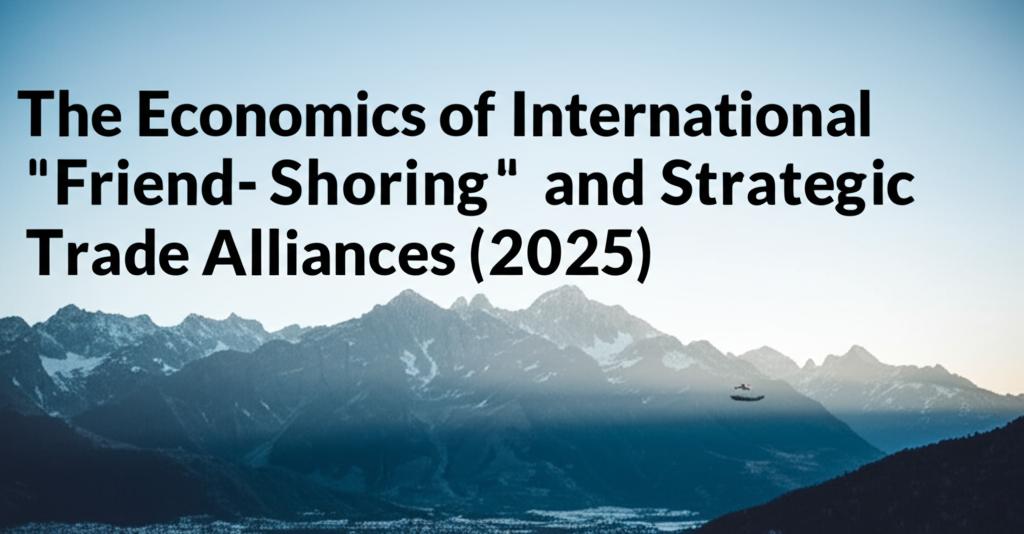As the global economic landscape continues to evolve, "friend-shoring" and the formation of strategic trade alliances are increasingly shaping international commerce in 2025. These strategies represent a shift away from pure cost-consideration in supply chain management towards a model that prioritizes geopolitical alignment, stability, and resilience.
The Dynamics of Friend-Shoring in 2025Friend-shoring, the practice of relocating supply chains to countries that are political and economic allies, has gained significant traction. This trend is driven by a desire to minimize risks associated with geopolitical tensions, trade disputes, and other disruptions that have impacted global supply chains in recent years. By prioritizing trade with "friendly" nations, countries and companies aim to create more secure and reliable supply networks.
However, the implementation of friend-shoring is not without its complexities. While it can offer increased stability and predictability, it also has the potential to lead to higher costs, as production may move to regions with higher labor or operational expenses compared to traditional offshoring destinations. Furthermore, the pool of "friendly" countries that also meet specific manufacturing or resource needs can be limited, potentially creating new dependencies.
Recent analyses in early 2025 indicate a nuanced evolution of this trend. Some businesses are moving beyond strictly limiting trade to geopolitical allies and are instead diversifying their trade networks across multiple regions to mitigate risk. This approach creates new opportunities but also adds complexity to supply chain management.
Strategic Trade Alliances: Reshaping Global EconomicsParallel to friend-shoring, strategic trade alliances are playing a pivotal role in reshaping international economics. Countries are increasingly leveraging free trade agreements (FTAs) and forming new economic blocs to enhance cooperation, facilitate trade flows, and align on standards and regulations. These alliances aim to promote market access and economic integration among member nations.
The rise of regional trade blocs, such as the Regional Comprehensive Economic Partnership (RCEP) in Asia, and potential new agreements in Africa and Latin America, signal a potential shift where regional trade could become more prominent. These alliances can help diversify trade relationships and reduce reliance on single dominant players.
Economic Impacts and ConsiderationsThe move towards friend-shoring and strategic trade alliances has several economic implications:
- Supply Chain Restructuring: Companies are actively re-evaluating and reconfiguring their supply chains. This involves diversifying sourcing, investing in regional hubs, and sometimes bringing manufacturing closer to home markets (nearshoring) or back to the home country (reshoring) in conjunction with friend-shoring strategies.
- Cost Implications: Shifting production and sourcing can lead to changes in input costs, transportation expenses, and overall operational efficiency. While friend-shoring aims for long-term stability, it might involve higher initial or ongoing costs compared to purely cost-driven offshoring.
- Inflation and GDP Impacts: Some economists warn that widespread friend-shoring and the potential fragmentation of the global economy into trading blocs could lead to reduced global GDP and potentially contribute to inflationary pressures. Estimates of potential global GDP losses vary, with some studies suggesting significant impacts if such trends lead to severe economic decoupling.
- Shifting Trade Balances: Trade policies, including tariffs and subsidies implemented by governments to encourage domestic production or favor allied nations, are redrawing trade maps and can impact global trade imbalances.
- Technological and Resource Segmentation: Unequal access to advanced technologies and critical raw materials can further drive the formation of competitive blocs, particularly in strategic sectors like clean energy and high-tech manufacturing.
- Impact on Different Economies: Developing economies are playing a significant role in the evolving trade landscape, with some, like Vietnam and India, deepening trade ties with specific partners. However, the impact varies, with some regions, like Africa, experiencing challenges such as shrinking intra-regional trade.
For businesses, navigating this evolving environment requires agility and strategic foresight. Key strategies include:
- Supplier Diversification: Reducing reliance on single countries or regions to minimize disruption risks.
- Investing in Technology: Automating processes and leveraging digital tools like AI-driven simulations and digital twins to enhance supply chain visibility and anticipate bottlenecks.
- Strengthening Regional Alliances: Maximizing the benefits of local trade agreements and building robust relationships with partners in aligned regions.
- Focus on Resilience: Building more resilient and adaptable supply chains that can withstand geopolitical shocks and economic volatility.
- Staying Abreast of Policy Changes: Closely monitoring evolving trade policies, tariffs, and sanctions that can impact sourcing and market access.
In conclusion, 2025 is a pivotal year where the economics of international friend-shoring and strategic trade alliances are actively reshaping global trade. While these strategies aim to enhance security and stability, they also present economic trade-offs and require careful consideration by businesses and policymakers alike. The long-term success of these approaches will depend on balancing geopolitical considerations with economic efficiencies and fostering international cooperation to prevent excessive fragmentation of the global economy.

